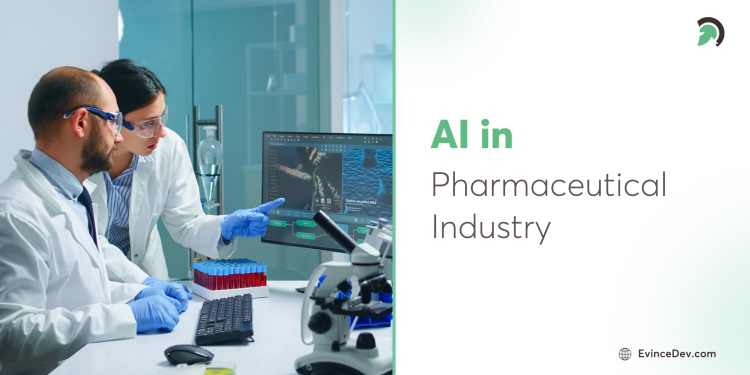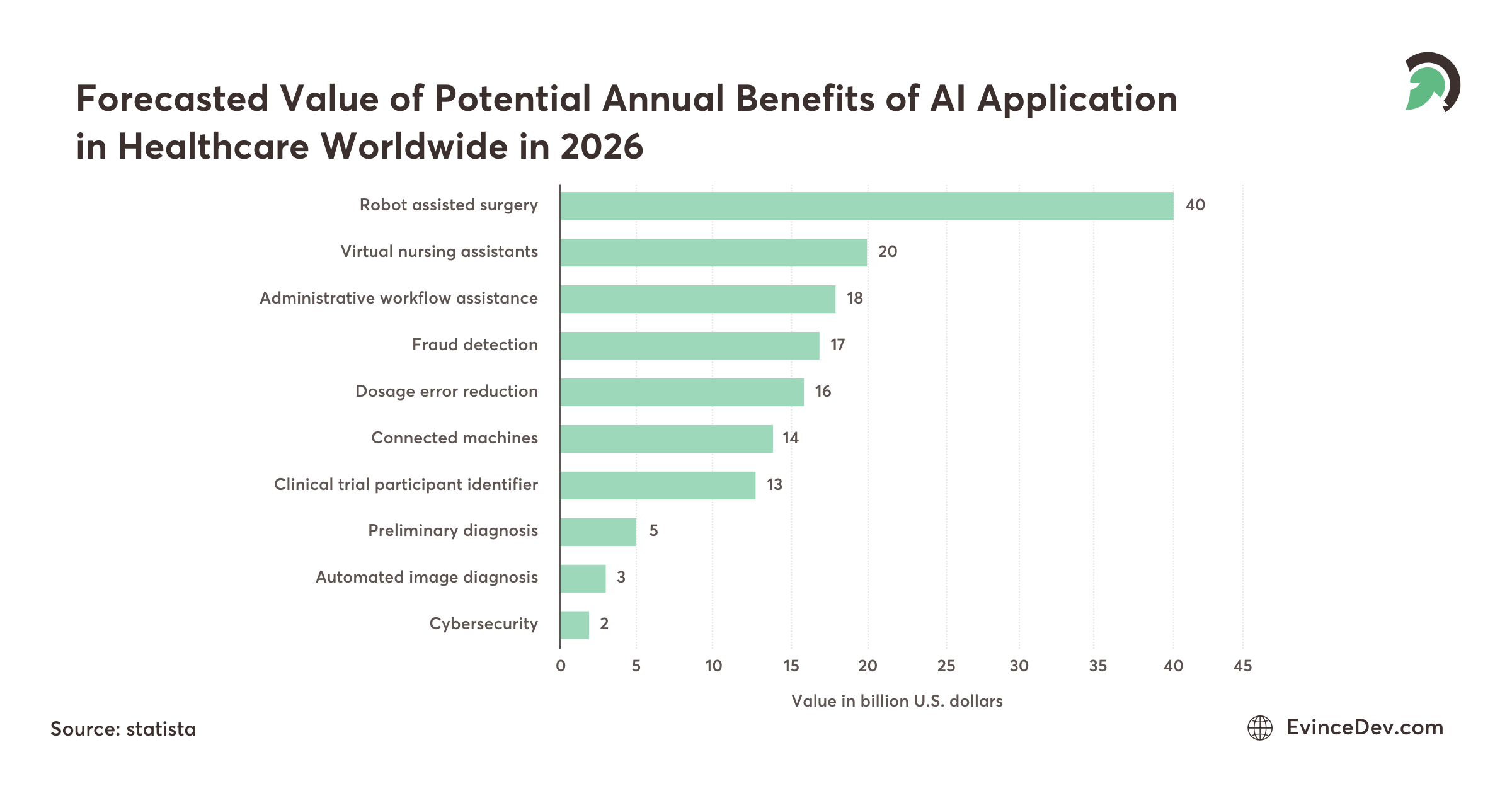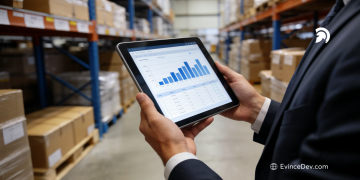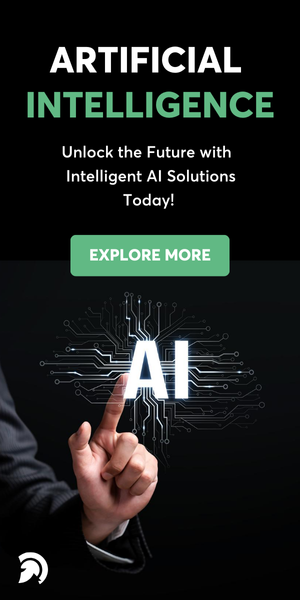Artificial Intelligence (AI) is reshaping industries across the globe, and the pharmaceutical sector is no exception. AI is transforming pharmaceutical companies’ operations by enhancing various stages of drug discovery, development, manufacturing, and patient care. AI-driven solutions improve patient outcomes, drive efficiency, and reduce costs within the pharmaceutical industry.
In this blog, we will explore how AI drives innovation, improves patient outcomes, and reduces costs and why the role of AI in the pharmaceutical industry is becoming crucial to the future of healthcare.
Rise of AI and Robotics in Healthcare: Essential Market Stats
- The global AI in drug discovery market was valued at $1.5 billion in 2023 and is projected to grow nearly ninefold by 2032, reflecting rapid innovation in the field.
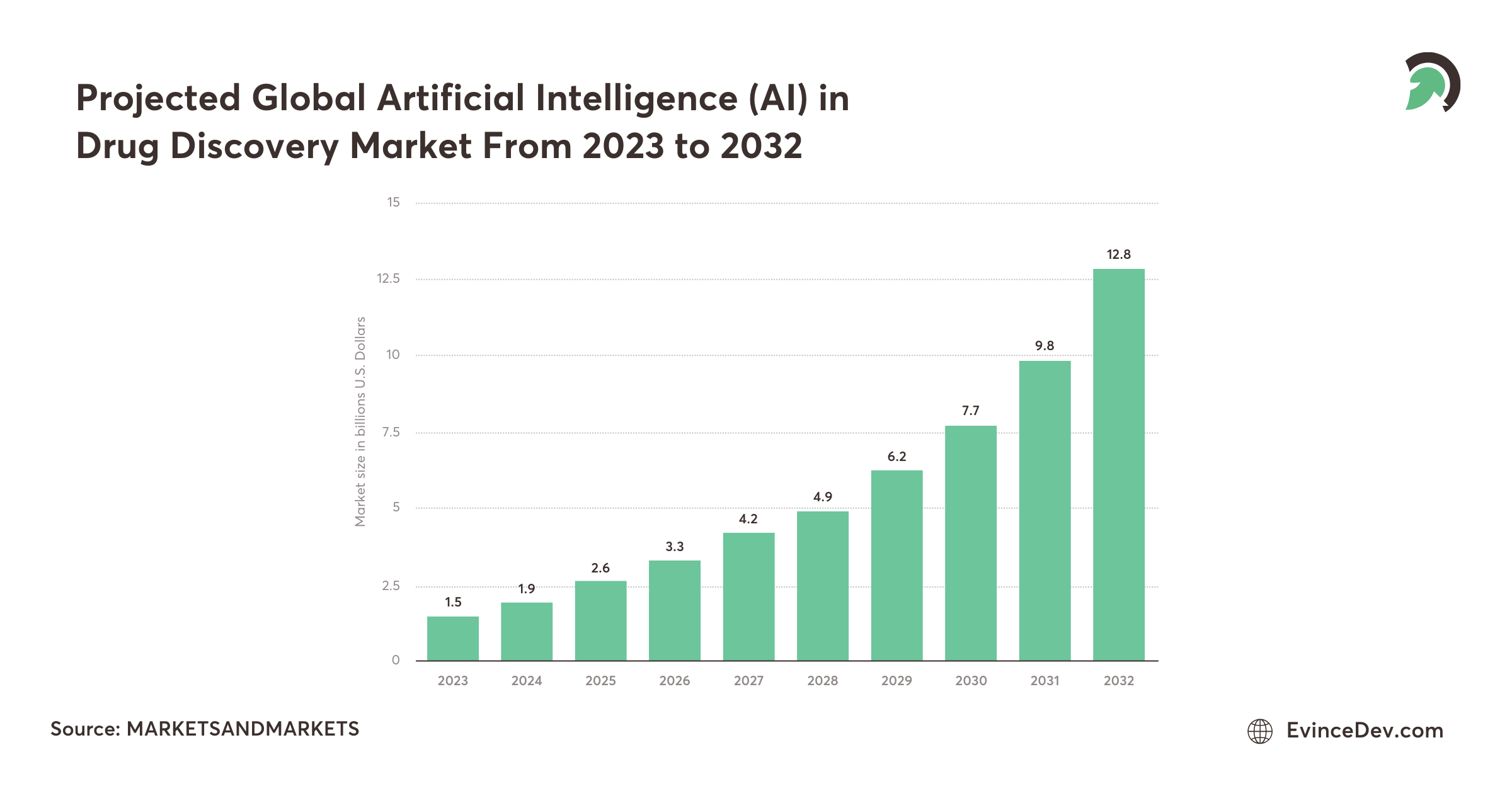
- The AI-driven healthcare market, worth $20.9 billion in 2024, is forecasted to grow to $148.4 billion by 2029, with a CAGR of 48.1%.
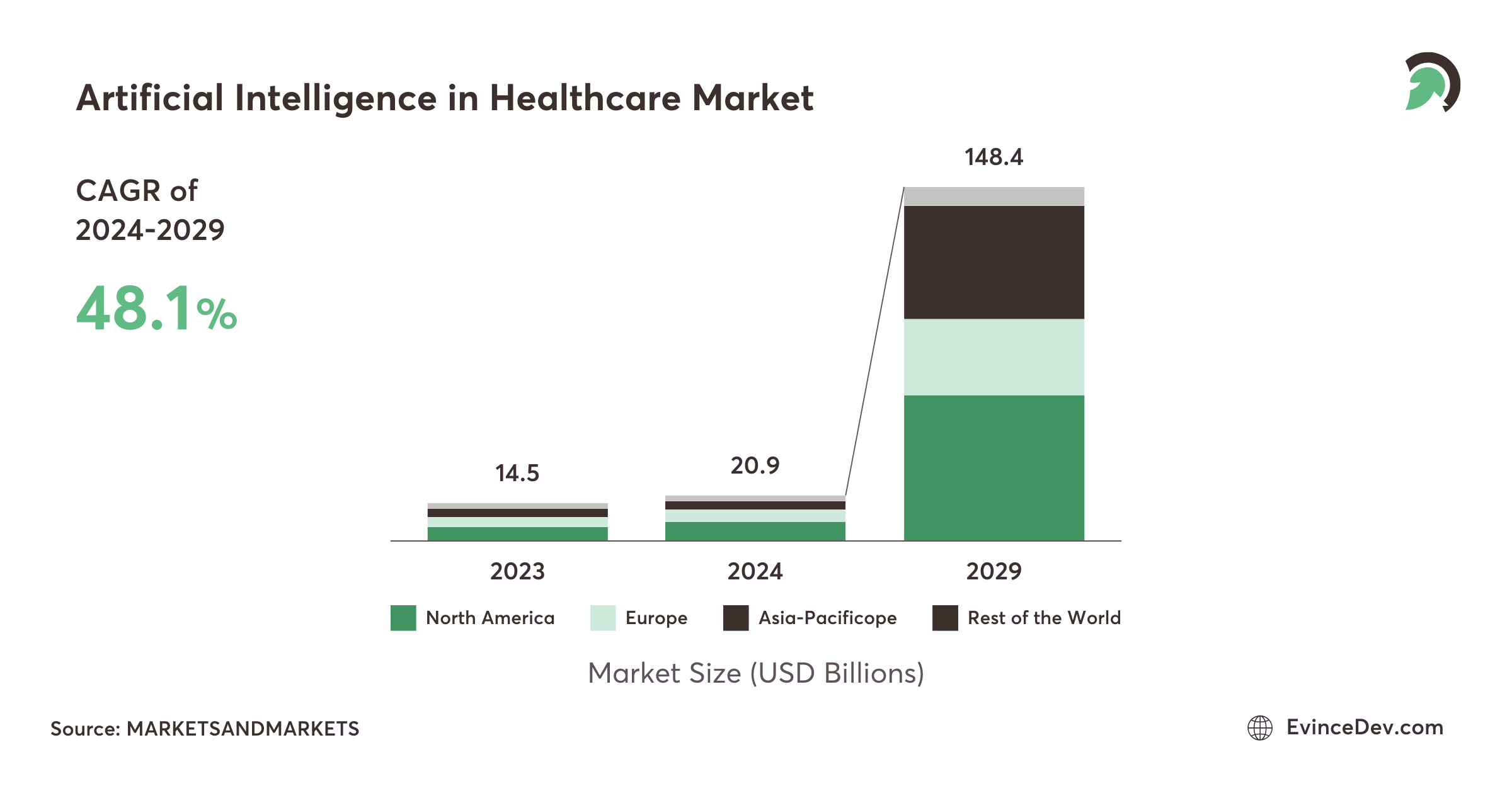
- By 2026, the annual potential benefits of robot-assisted surgery in healthcare were anticipated to amount to $40 billion globally.
How AI is Revolutionizing Pharmacy: Key Use Cases and Innovations
1. AI in Drug Development: Accelerating Discovery and Innovation
AI dramatically reduces the time and cost of drug development, helping pharmaceutical companies bring life-saving medications to market faster. With the advent of AI development solutions, companies are leveraging advanced machine learning models to expedite the process.
Key Benefits of AI in Drug Development:
- Predictive Modeling: AI algorithms predict the efficacy and safety of compounds in preclinical stages, reducing the risk of failure during clinical trials.
- Reduced Costs: AI helps pharmaceutical companies avoid costly late-stage trial failures by predicting which compounds are most likely to succeed.
- Improved Success Rates: Machine learning models are also helping researchers understand how drugs interact with biological systems, improving the success rates of new therapies.
2. Personalized Medicine: Tailoring Treatments to Individual Patients
AI drives the shift toward personalized medicine, enabling pharmaceutical companies to develop drugs and treatments tailored to patients.
How AI Powers Personalized Medicine:
- Genetic Data Analysis: AI-powered tools analyze genetic, environmental, and lifestyle factors to develop customized treatments, improving outcomes and reducing side effects.
- Biomarker Identification: AI helps identify disease biomarkers, allowing for earlier detection and more accurate diagnosis, particularly in diseases like cancer and genetic disorders.
- Optimized Treatment Plans: With AI, doctors can create highly personalized treatment plans based on a patient’s unique genetic makeup and medical history.
AI also facilitates faster drug repurposing, identifying potential new applications for existing drugs, and accelerating the development process.
3. Optimizing Clinical Trials with AI Solutions
Clinical trials are a critical phase of drug development, and AI is making these trials more efficient, cost-effective, and precise. The application of AI in pharmaceutical research and healthcare software has revolutionized trial designs.
AI Applications in Clinical Trials:
- Participant Recruitment: AI algorithms analyze patient data to identify suitable candidates for clinical trials, ensuring faster recruitment and reducing the time needed to complete studies.
- Predicting Patient Responses: Machine learning tools predict how patients respond to drugs, enabling faster trial results and better decision-making.
- Improved Adherence and Monitoring: AI-powered platforms track patient adherence to trial protocols and monitor real-time progress, improving the quality and reliability of clinical trial data.
4. AI-Enhanced Pharmaceutical Manufacturing Processes
AI improves drug manufacturing by optimizing production efficiency, ensuring quality, and reducing costs. Pharmacy management software and AI solutions are transforming how pharmaceutical companies manage their operations.
Benefits of AI in Pharmaceutical Manufacturing:
- Predictive Maintenance: AI algorithms predict when equipment will likely fail, allowing for preemptive maintenance and minimizing production downtimes.
- Supply Chain Optimization: AI helps pharmaceutical companies predict drug demand and optimize inventory levels, reducing waste and ensuring timely delivery of medications.
- Quality Control: AI tools monitor production in real time, ensuring products meet stringent quality standards and regulatory requirements.
5. AI in Disease Prediction and Prevention
AI also plays a pivotal role in disease prevention, helping pharmaceutical companies predict disease outbreaks and improve public health outcomes. Its role in pharmaceutical research is key to identifying targeted treatments and improving early diagnosis.
How AI Contributes to Disease Prediction:
- Epidemiological Insights: AI analyzes large datasets of epidemiological information to predict potential disease outbreaks, allowing for timely interventions.
- Improved Diagnostics: AI-powered platforms help identify early warning signs of diseases, such as cancer, cardiovascular conditions, and infectious diseases.
- Targeted Treatments: By understanding disease patterns, AI helps pharmaceutical companies develop targeted therapies that can be more effective and have fewer side effects.
6. AI for Drug Repurposing: Unlocking New Uses for Existing Drugs
AI enables pharmaceutical companies to repurpose existing drugs for new therapeutic uses, accelerating drug development. It is also being utilized in drug repurposing, helping uncover new treatments faster.
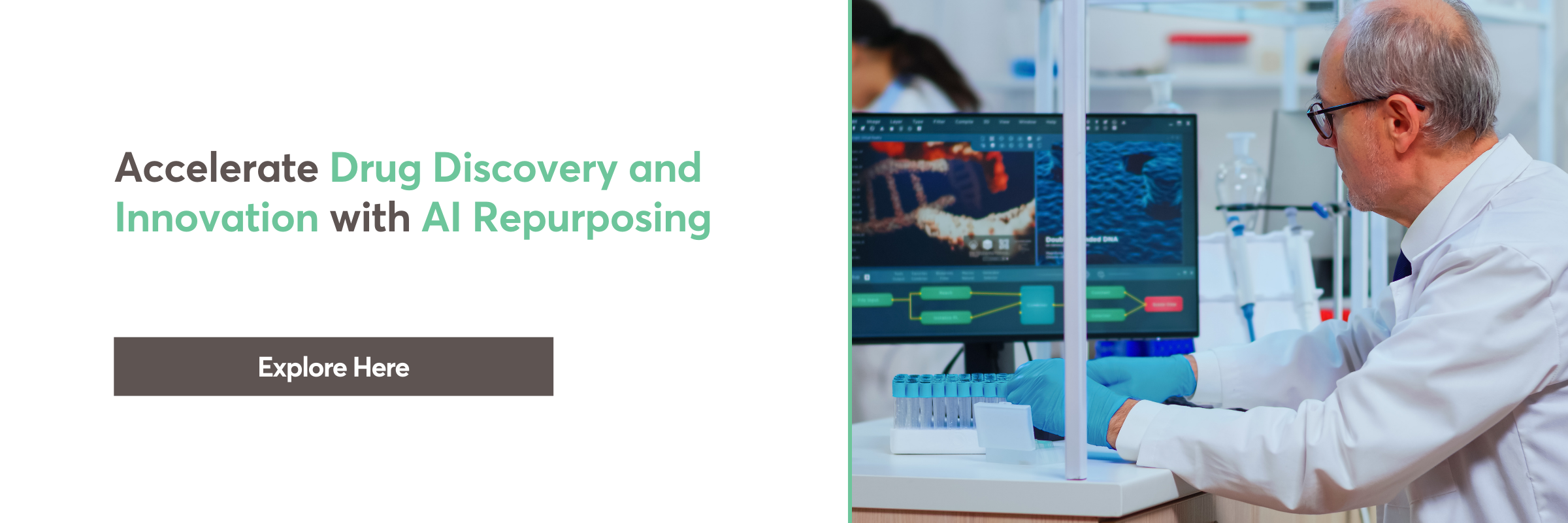
How AI Helps in Drug Repurposing:
- Machine Learning Models: AI analyzes vast amounts of clinical and molecular data to identify potential new uses for existing drugs.
- Speeding Up the Repurposing Process: AI helps pharmaceutical companies quickly evaluate whether an existing drug can effectively treat other diseases, reducing the time and cost of drug development.
- Real-Time Insights: AI-powered platforms continuously analyze emerging scientific research, helping identify promising candidates for repurposing.
7. AI in Pharmacovigilance: Enhancing Drug Safety Monitoring
Pharmacovigilance is essential for ensuring drug safety after being approved for market use. AI enhances the ability to monitor and manage drug safety more effectively, ensuring patient safety and compliance.
AI Applications in Drug Safety:
- Real-Time Monitoring: AI-driven tools continuously monitor patient data to detect any adverse reactions or side effects from drugs, ensuring timely responses.
- Predicting Safety Risks: Machine learning models predict potential risks by analyzing historical data and identifying patterns indicating emerging safety concerns.
- Automated Reporting: AI automates the reporting process, improving the accuracy and speed of adverse event reporting, which is essential for regulatory compliance.
8. Overcoming Drug Pricing Challenges with AI
AI helps pharmaceutical companies tackle the challenge of high drug prices by optimizing drug production and distribution, making treatments more affordable and accessible.
AI’s Role in Reducing Drug Prices:
- Cost-Effective Production: AI improves manufacturing efficiency, reducing costs associated with drug production and enabling companies to lower prices.
- Demand Forecasting: AI predicts market demand more accurately, ensuring that pharmaceutical companies produce the right amount of drugs, reducing overproduction and waste.
- Streamlining Regulatory Processes: AI accelerates regulatory approval processes, helping pharmaceutical companies get drugs to market faster and more affordably.
9. Addressing Ethical Considerations in AI Adoption
While AI offers tremendous benefits, its implementation in the pharmaceutical industry raises critical ethical concerns that must be carefully managed.
Key Ethical Considerations in AI Implementation:
- Data Privacy: Protecting sensitive patient data is critical. Healthcare app development must adhere to stringent data protection regulations to ensure privacy.
- Algorithm Bias: AI models must be trained on diverse datasets to avoid bias that could lead to incorrect or discriminatory healthcare outcomes.
- Transparency: Pharmaceutical companies must be transparent about how AI models are used in drug development, clinical trials, and treatment recommendations.
Future of AI in Pharmaceuticals: A New Era of Drug Development and Patient Care
The future of AI in the pharmaceutical industry is bright. As AI technologies continue to evolve, they will reshape the landscape of drug development, personalized medicine, and patient care. Here’s a glimpse of what lies ahead:
Precision Medicine and AI Integration
In the future, AI will play an even more critical role in precision medicine. By analyzing vast amounts of data from genomics, medical records, and wearable devices, AI will deliver highly personalized treatments that improve drug effectiveness and reduce side effects, ensuring that every patient receives the most suitable care.
Real-Time Healthcare Monitoring
AI will enable real-time healthcare monitoring, integrating wearables and patient feedback data to track health metrics continuously. This constant flow of information will allow for more accurate and timely adjustments to treatment plans, improving patient care and drug efficacy.
